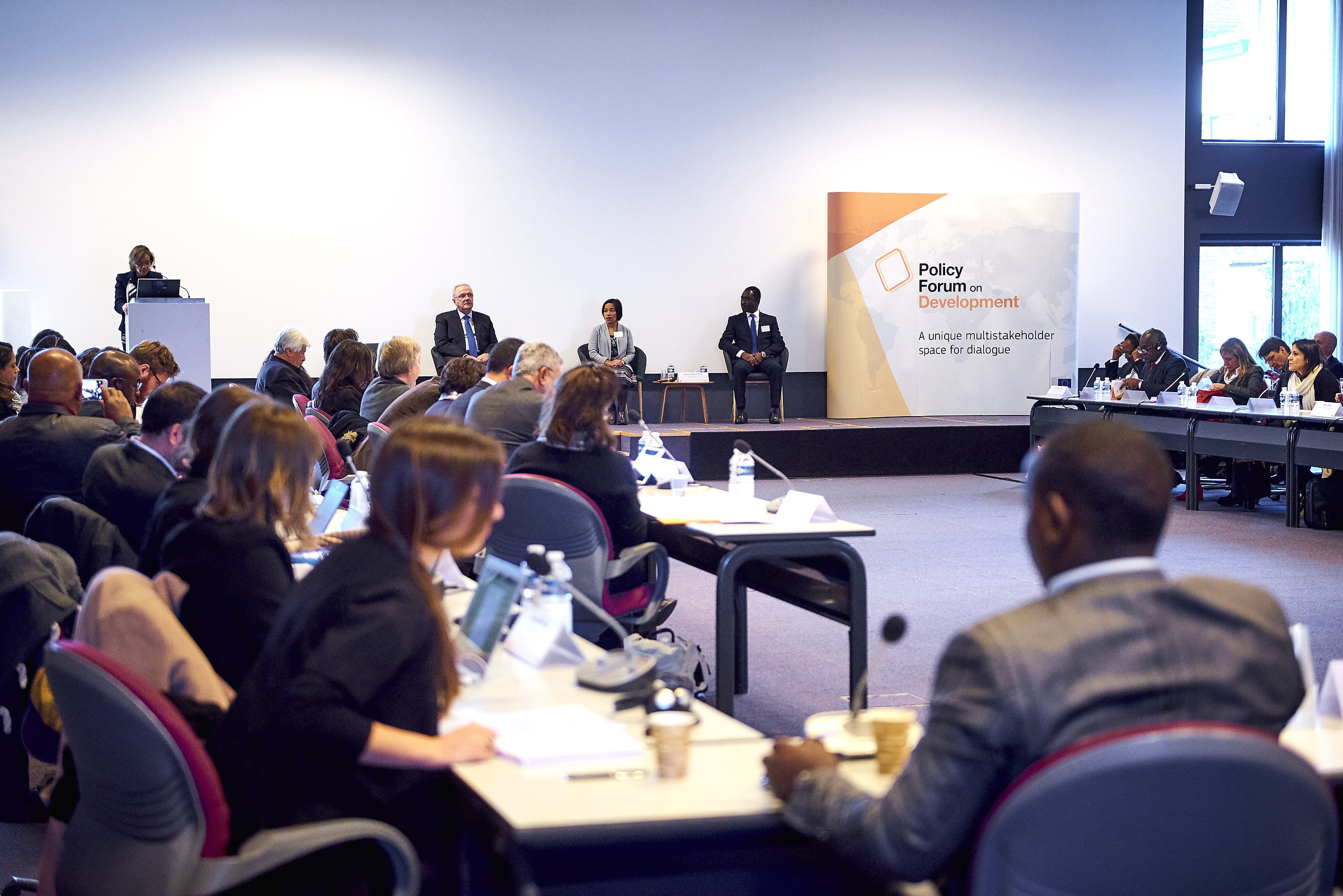6th Global Meeting March 2018
From 20 - 22 March the 6th Global Meeting of the Policy Forum on Development (PFD) took place in Brussels, Belgium. More than 80 representatives of civil society organisations (CSOs), local authorities (LAs), the private sector, EU Member States and EU institutions gathered to discuss the most challenging EU development policies at present. Topics featured included enabling environment/shrinking spaces of CSOs and LAs; policy coherence for development; the role of cities and decentralised cooperation; a local approach to migration; new financial instruments; domestic resource mobilisation and post-2020 partnerships (Post-Cotonou Agreement, the upcoming multi-annual financial framework).
List of participants.

Quick Access |
||
| Tuesday | Wednesday | Thursday |

Management Centre Europe Rue de l’Aqueduc 118, 1050 Brussels
20 – 22 March 2018
#PFDGlobal
|
AGENDA |
|||
|
8:30-10:00 |
Registration |
||
|
9:00-12:00 |
Task Team Meeting TT members only 9:00-12:00 |
Regional caucuses PFD Members meet by region 10:00-12:00 |
Private Sector Meeting Invitation only 9:00-12:00 |
|
12:00-13:30 |
Lunch |
||
|
13:30-14:15 |
1. Opening |
||
|
Welcome speeches
Civil Society Organisations Co-Chair
|
|||
|
14:15-16:30 |
2. Enabling Environment: How to confront new challenges: employing the multi- stakeholder approach to enhance the enabling environment for inclusive development cooperation |
||
|
Objective: To address the conditions that enable partners to maximise their contribution to development in the current global political climate, taking into account recent PFD regional meetings.
Moderator: Maria Theresa Lauron, Chair CSO Partnership for Development Effectiveness and PFD CSO Co-Chair |
|||
|
|
Speakers:
|
|
16:30-17:00 |
Coffee break |
|
17:00-18:30 |
Key note speech by Louise Arbour, UN Special Representative of the Secretary General on International Migration with an introduction by the Directorate General for International Cooperation and Development, European Commission |
|
18:30-20:00 |
Cocktail and walking dinner (MCE) |
|
|
|
|
Wednesday, 21 March |
|
|
09:00-11:00 |
3. Policy coherence for development in the 2030 Agenda: the case for aid for trade |
|
Objective: Examine how the implementation of the EU aid for trade strategy will help generate sustainable development impacts, along with the EU trade (Trade For All) strategy. The session will look at the importance of policy coherence for development to ensure development effectiveness of the development-trade nexus. Moderator: Maruxa Cardama, Global sustainability agendas advisor Speakers:
Directorate General for International Cooperation and Development, European Commission
|
|
|
11:00-11:30 |
Coffee break |
|
11:30-13:00 |
4. Innovative Development Assistance: How can blending Official Development Assistance (ODA) with private and public loans contribute to the SDGs |
|
|
Objective: To look at tools such as blending and the European External Investment Plan (EIP) in the context of increasing expectations from private finance in development cooperation and make recommendations regarding implementation to ensure development effectiveness.
Moderator: Paolo Ciccarelli, Head of Unit, Cities, Local Authorities, Digitalisation, Infrastructures, Directorate General for International Cooperation and Development, European Commission
Speakers:
|
|
13:00-14:00 |
Lunch |
|
14:00-15:30 |
5. Domestic Resource Mobilisation |
|
Objective: To identify the key issues related to the mobilization of domestic resources based on successful experiences of different actors, including local authorities (LAs), civil society organisations (CSOs) and private sector.
Moderator: Maruxa Cardama, Global sustainability agendas advisor Speakers:
|
|
|
15:30-17:00 |
6. Working groups |
|
|
Objective: To allow smaller groups to debate on the three topics of the day, namely aid for |
|
|
trade, blending/European Investment Plan and Domestic Resource Mobilisation, their regional challenges and recommendations. |
|
17:00-18:00 |
7. Feedback from groups of the day |
|
Objective: To bring the highlights of the smaller group discussions back to plenary for debate. |
|
|
|
|
|
Thursday, 22 March |
|
|
9:00-11:00 |
8. Migration: A local approach |
|
Objective: To analyse the irregular migration and forced displacement phenomenon in the axis of security, development and resilience. The session will focus on the root causes of migration at the local level and discuss how European policies can foster place-based solutions, in particular, urban governance, territorial approach to local development and support to local actors. Moderator: Shada Islam, Friends of Europe
Speakers:
|
|
|
11:00-11:30 |
Coffee break |
|
11:30-13:00 |
9. The EU partnership approach: the post 2020 MFF, Post-Cotonou and its potential impact on other regional agreements |
|
Objective: Building on the EU-ACP Cotonou Partnership Agreement, exchange on the post- 2020 EU development cooperation trends at regional levels and ways on how to increase the multi-stakeholder involvement dimension. Moderator: Shada Islam, Friends of Europe Speakers: |
|
|
|
Cooperation and Development, European Commission
|
|
13:00-14:00 |
Lunch |
|
14:00-15:30 |
10. Information Session on the future Multi-annual Financial Framework |
|
|
Objective: To provide an update on the future Multi-annual Financial Framework and an opportunity to exchange with PFD members. Speakers:
Coordination, European External Action Service |
|
15:30-16:30 |
Closing |
|
Closing speeches and discussion around the most salient points of the forum
Speakers:
|

